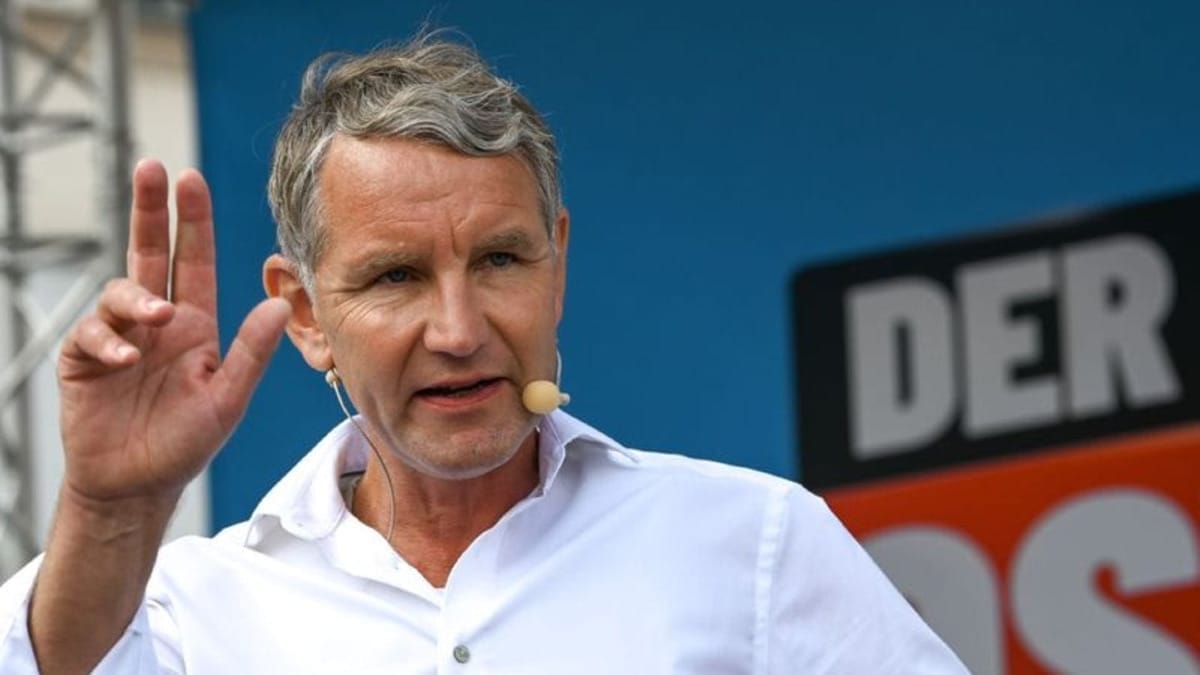The Rise of Björn Höcke: A Controversial Figure at the Center of Germany’s Political Storm
For the first time since the Nazi era, the far-right is poised to win the most votes in German state elections
Björn Höcke, a controversial and polarizing figure in German politics, has once again taken center stage, drawing both condemnation and support. As a leading member of the far-right Alternative for Germany (AfD), Höcke's radical views and rhetoric have ignited fierce debates, especially in the eastern state of Thuringia, where the party is projected to make significant gains in the upcoming elections.
A History of Controversy
Höcke has been a lightning rod for controversy for several years. In 2019, a German court ruled that it was legally permissible to refer to him as a "fascist," citing his critical stance on Germany’s politics of remembrance, particularly regarding the Holocaust and the country's Nazi past. Höcke's call for a "180-degree turn" on the way Germany addresses its historical atrocities has sparked outrage, with many accusing him of attempting to rehabilitate elements of National Socialism.
The accusations are not without substance. Höcke has frequently referenced figures from the Nazi era, including poets and publicists with known fascist sympathies. In the AfD's election manifesto for Thuringia, he included a poem by Franz Langheinrich, an ardent National Socialist. Additionally, on his social media accounts, he has approvingly quoted Arthur Moeller van den Bruck, a nationalist thinker who envisioned a "Third Reich," a term later co-opted by Adolf Hitler for his brutal regime.
A Radical Campaign and a Divided Public Opinion
Höcke's rhetoric has not only led to his political isolation but also resulted in legal consequences. In 2024, he was fined twice for using Nazi slogans at public rallies. Despite this, the AfD's popularity in Thuringia continues to rise, alarming many observers who fear the normalization of extremist ideologies in German politics.
"There's a real danger that if we don't put a stop to this, these far-right movements will grow unchecked," warned a political analyst in Berlin. "We could see the collapse of the political 'firewalls' that have traditionally kept extremist parties out of power."
Höcke's campaign has centered on themes that resonate with many in the east, such as opposition to German military aid for Ukraine. He has called for a complete halt to such support, arguing that "no war must ever start from German soil again," a message that strikes a chord with war-weary voters in Thuringia.
Embracing Authoritarian Models: Höcke’s Admiration for Putin
Höcke's admiration for Russian President Vladimir Putin further cements his controversial image. He views Putin’s autocratic governance as a potential model for Germany, a stark contrast to the liberal democratic order. "Russia today, whether the mainstream media likes it or not, represents a country where not only negative associations are linked," Höcke has stated, hinting at a desire to emulate Putin’s approach to consolidating power and curtailing democratic freedoms.
Historians have pointed out that the connection between right-wing movements like the AfD and Putin lies not in a genuine affinity for the Russian leader but rather in a shared desire for an authoritarian state model. "They don't necessarily see Putin as a savior," explained a political historian. "They view his methods of control as a template for their vision of governance."
Election Uncertainty and the Potential for Political Upheaval
The upcoming elections in Thuringia and neighboring Saxony may mark a turning point in German politics. With the AfD gaining ground, Chancellor Olaf Scholz and his coalition partners are under immense pressure. In a recent campaign event in Thuringia, Scholz faced a hostile reception, with chants of "Volksverräter" ("traitor of the people") interrupting his speech.
The discontent among voters is palpable, driven not only by concerns over immigration but also by broader frustrations about economic inequalities, perceived overreach of green policies, and disillusionment with the federal government's handling of various crises. In Thuringia, this dissatisfaction has found a voice in the AfD, which has managed to channel decades-old grievances stemming from German reunification.
A Divided Nation at a Crossroads
As the election day draws closer, Germany finds itself at a crossroads. For some, the rise of the AfD represents a nightmare scenario, a resurgence of far-right politics that threatens to undo decades of democratic progress. For others, particularly in the east, the party offers a chance for change, a voice for those who feel forgotten by the political establishment.
Regardless of the outcome, the political landscape in Germany is shifting, and the results of the upcoming elections could have far-reaching implications, both domestically and across Europe. As Germany grapples with its past, the future remains uncertain, with figures like Björn Höcke at the epicenter of this ongoing political storm.






